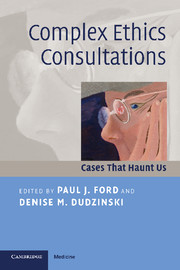Book contents
- Frontmatter
- Contents
- List of contributors
- Foreword
- Acknowledgments
- Introduction: Live and learn: courage, honesty, and vulnerability
- Part I Starting at the beginning: prenatal and neonatal issues
- Part II The most vulnerable of us: pediatrics
- Part III Diversity of desires and limits of liberty: psychiatric and psychological issues
- Part IV Withholding therapy with a twist
- Part V The unspeakable/unassailable: religious and cultural beliefs
- Part VI Human guinea pigs and miracles: clinical innovations and unorthodox treatment
- Part VII The big picture: organizational issues
- 25 It's not my responsibility
- 26 Intra-operative exposure to sporadic Creutzfeldt-Jakob disease: to disclose or not to disclose
- 27 Why do we have to discharge this patient?
- 28 Who's that sleeping in my bed? An institutional response to an organizational ethics problem
- Conclusions, educational activities, and references
- Index
27 - Why do we have to discharge this patient?
Published online by Cambridge University Press: 03 May 2010
- Frontmatter
- Contents
- List of contributors
- Foreword
- Acknowledgments
- Introduction: Live and learn: courage, honesty, and vulnerability
- Part I Starting at the beginning: prenatal and neonatal issues
- Part II The most vulnerable of us: pediatrics
- Part III Diversity of desires and limits of liberty: psychiatric and psychological issues
- Part IV Withholding therapy with a twist
- Part V The unspeakable/unassailable: religious and cultural beliefs
- Part VI Human guinea pigs and miracles: clinical innovations and unorthodox treatment
- Part VII The big picture: organizational issues
- 25 It's not my responsibility
- 26 Intra-operative exposure to sporadic Creutzfeldt-Jakob disease: to disclose or not to disclose
- 27 Why do we have to discharge this patient?
- 28 Who's that sleeping in my bed? An institutional response to an organizational ethics problem
- Conclusions, educational activities, and references
- Index
Summary
Case narrative
At this medium-sized urban hospital, the chair of the ethics committee usually responded to requests for ethics consultations by either personally doing consults, referring others to another member of the committee who was either on-call or knowledgeable about a specific issue, or by convening the entire ethics committee to discuss challenging cases. I was a community member, recruited by the chair due to my academic appointment and credentials in ethics. I received a phone call over the weekend that there would be an urgent ethics committee meeting on Tuesday morning at 7 a.m. An ethics consultation request had been received on Friday. The ethics committee chair had reviewed the case and decided it merited full committee review.
Approximately ten clinicians and other hospital employees were present for the Tuesday morning meeting. We learned immediately that Mr. Leary, the patient, had died the evening before at his home. The rest of the case unfolded in the ensuing discussion. Mr. Leary was described as an independent 76-year-old curmudgeon prior to a stroke eight weeks ago. The stroke left him with complete left-sided paralysis. He suffered a second stroke two weeks after the first, resulting in both receptive and expressive aphasia – he could neither understand speech nor could he formulate words. He also appeared depressed after the second event. Three weeks ago, he suffered a third stroke. While this stroke worsened his physical condition, it seemed to improve his mood. At times, he appeared almost jovial. He became cooperative with care, even attempting to assist with shaving each morning.
- Type
- Chapter
- Information
- Complex Ethics ConsultationsCases that Haunt Us, pp. 212 - 218Publisher: Cambridge University PressPrint publication year: 2008



